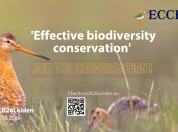Search
Filter by
Type
Tags
Dossiers
Themes
Departments
Active filters
1049 search results
Search results
-
UNLOCK location Wageningen
UNLOCK is a unique large-scale research infrastructure that facilitates research on mixed microbial communities. It consists of three experimental platforms (Biodiscovery, Modular Bioreactor, Parallel Cultivation) and a FAIR data platform. UNLOCK provides a wide range of users with easily accessible and affordable state-of-the-art facilities and equipment, which allow for research resulting in scientific discovery and practical applications. Facilities are equipped to work with strictly anaerobic microorganisms.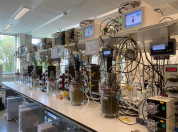
-
Experimental garden
The experimental garden at the Radboud Institute for Biological and Environmental Sciences is a unique, modern facility that consists of a greenhouse, climate chambers, phytotron, experimental field, and aquatic mesocosms. These facilities can be used for research on the effect of climate change on plants, insect pollination, and GMOs.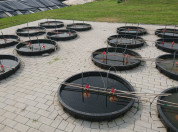
-
LifeWatch ERIC – Virtual Laboratory and Innovation Center
LifeWatch ERIC is a research infrastructure for biodiversity and ecosystems research. They have offices on multiple locations around Europe. The University of Amsterdam hosts their Virtual Laboratory and Innovation Center, where they offer innovative solutions for building virtual labs. Those virtual labs are used by scientists across Europe for digital experiments and collaborating on biodiversity research.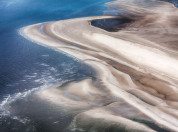
-
From stress to success: rapid evolution as a survival strategy against environmental stressors
When you think of evolution, you probably think of Darwin, timescales of millions of years and dinosaurs. But there is also rapid evolution, microevolution, a way in which organisms can quickly adapt to changes in their environment. This is becoming increasingly important for the survival of species, in view of climate change and other human disturbances in ecosystems.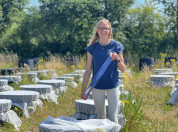
-
Movie showing "The Dark Side of Bright Nights" during the Night of the Night
Visit the Night of the Night special on Saturday 25 October! Only then will the documentary The Dark Side of Bright Nights be shown throughout the Netherlands.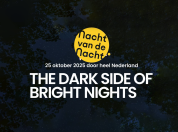
-
Shining a light on nature – the importance of darkness
Since 2012, the Netherlands Institute of Ecology (NIOO-KNAW) has been conducting research into the effect of artificial light at night on our natural environment. For this research – Light on Nature – streetlights have been installed at four locations in the Veluwe and one location in Drenthe. Since then, they have been lit year-round from sunset to sunrise. Various institutes, universities and organisations are using these streetlights to measure the effects on different species groups.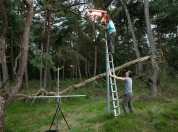
-
Leonardo Bassi
Postdoc
-
Emma Sellers
PhD Candidate
-
Nicky Brouwer
Project Assistant
-
European Congress for Conservation Biology (ECCB)
How can biodiversity be safeguarded effectively in the long term? This is the core question of the 8th European Congress for Conservation Biology (ECCB). The congress will be held in Leiden, from 6 until 10 July 2026.